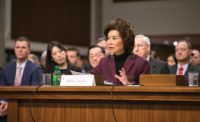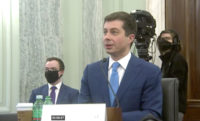Elaine Chao, President-elect Trump’s nominee to lead the Dept. of Transportation is a lock to be approved by the Senate, judging from the warm reception she received during her Jan. 11 confirmation hearing before the Commerce, Science and Transportation Committee.
Committee members did try to get Chao to provide details of Trump’s proposed $1-trillion, 10-year infrastructure investment proposal—with little success.
Though the committee’s broad transportation jurisdiction doesn’t include highway construction, road and bridge funding was a major topic of discussion.
There were few if any criticisms leveled at Chao, a former Secretary of Labor and DOT deputy secretary. Committee Chairman John Thune (R-S.D.) said, “I would say that, if you were to imagine an ideal candidate to tackle these challenge [facing DOT], it would be hard to come up with a more qualified nominee than the one before us.”
It didn't hurt Chao's confirmation chances that her husband is Majority Leader Mitch McConnell (R-Ky.), who introduced her at the hearing.
Committee members quizzed Chao about her views across DOT’s wide range of responsibilities, from air-traffic control to highway safety and also reminded her about projects or topics important to their states.
Asked repeatedly about the President-elect’s infrastructure proposal, Chao didn’t provide specifics, noting that the Trump team will be assembling an infrastructure task force to put the plan together.
She did outline some broad aims, noting that one “major challenge is to unleash the potential for private investment in our nation’s infrastructure.”
She added, “In order to take full advantage of the estimated trillions in capital that equity firms, pension funds, and endowments can invest, these partnerships must be incentivized with a bold new vision.”
Chao also indicated that the plan, would involve “a mix of practical solutions—both public and private—that provide the greatest cost-benefit to the public.”
Newly elected Sen. Todd Young (R-Ind.) asked further about public-private partnerships. Chao said: “There are times when public-private partnerships have not been welcomed. And so, at the very minimum we need to do away with some of these impediments.”
She added, “And private investment is encouraged to enter when they see a bold vision. And this president has a bold vision. We will be talking about it when the administration comes into being after January 20th.”
During the presidential race, the Trump campaign released a document that discussed attracting private infrastructure investment through tax credits of $137 billion. Sen. Cory Booker (D-N.J.) referred to that proposal and asked Chao whether the Trump administration also would support direct federal infrastructure spending as part of the plan. She said, “I believe the answer is yes.”
Highway funding was another popular topic. Senators from fast-growing Colorado and Nevada noted that current federal highway funding distribution formulas use outdated population numbers, which shortchange their states on highway dollars.
Interstate fights over shares of the highway funding pie were central issues in past highway bill debates. But Congress left those formulas unchanged in the most recent major highway-transit law, the 2015 FAST Act. That statute doesn’t expire until 2020.
Chao said, “If the Congress wishes to change the formula, that is obviously a conversation the administration would have with the Congress.”
Sen. Deb Fischer (R-Neb.) brought up the Highway Trust Fund’s revenue problem, saying that the fund faces a projected $107-billion, five-year shortfall after the FAST Act expires in 2020.
Chao agreed that the fund “is in bad shape,” saying that its annual revenue runs $10 billion short of spending. “This is a huge issue,” she added.
Transfers from the general fund are keeping the program out of the red, for now.
Chao didn’t offer a rescue plan for the trust fund. She observed that “the ‘pay-fors’ for any infrastructure proposal are all challenging and all have their particular champions and also detractors.” Working on a trust fund solution, she added, will be “among the top priorities” for the new President.
Story corrected on Jan. 12: infrastructure proposal involved $137 billion in tax credits, not $137 million.





Post a comment to this article
Report Abusive Comment